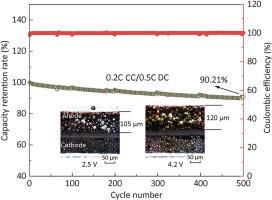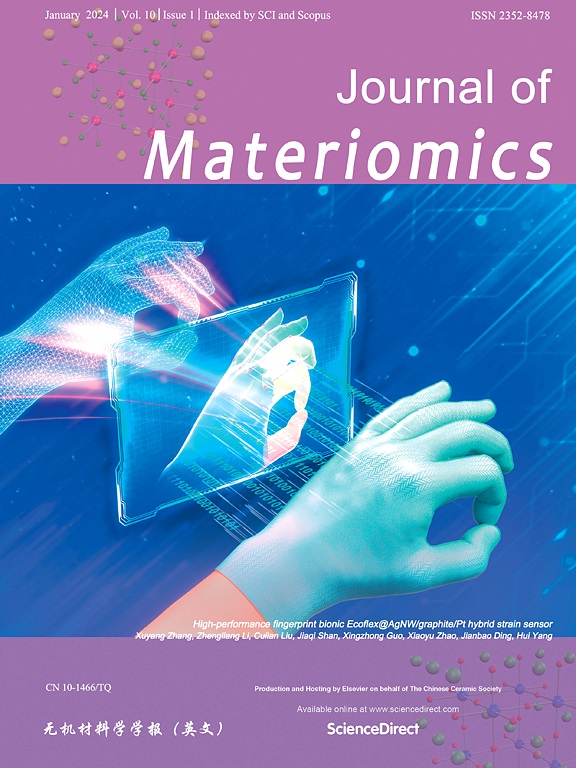Unleashing the potential: SiOx@GNs composites for superior lithium-ion battery anodes
IF 9.6
1区 材料科学
Q1 CHEMISTRY, PHYSICAL
引用次数: 0
Abstract
SiOx is commonly used in lithium-ion batteries because of its capacity and affordability, but it has issues with volume expansion and conductivity. Synthetic methods are crucial for achieving the desired microstructure and material properties. This study introduces a new technique, fluidized bed granulation, to produce SiOx@GNs composites. These composites have a core-shell structure with SiOx particles coated in graphene sheets, and high-energy vibration is used to create a SiOx-Fe structure on the surface. The graphene coating prevents volume expansion and enhances electron transfer. Real-time confocal imaging shows the charging and discharging process. Experiment results show that the SiOx@GNs electrode has a lower expansion rate of 53.60% compared to 73.04% for the SiO electrode, indicating improved electrochemical properties with the graphene coating. After 100 cycles at 2 C, SiOx@GNs demonstrate a reversible capacity of 1265.8 mA⋅h⋅g−1 and discharge capability at 7 C with a capacity of 1050 mA⋅h⋅g−1. The battery retains 90.21% of its capacity after 500 cycles at 0.5 C, showing potential as a LIB anode alternative with a unique structure for different energy storage materials. Fluidized bed granulation can aid in scaling up the use of SiOx anodes in lithium-ion batteries.

释放潜能:SiOx@GNs 复合材料用于制造优质锂离子电池阳极
氧化硅因其容量大、价格低廉而常用于锂离子电池,但它在体积膨胀和导电性方面存在问题。要获得理想的微观结构和材料性能,合成方法至关重要。本研究介绍了一种生产 SiOx@GNs 复合材料的新技术--流化床造粒。这些复合材料具有核壳结构,SiOx 颗粒涂覆在石墨烯薄片上,利用高能振动在表面形成 SiOx-Fe 结构。石墨烯涂层可防止体积膨胀并增强电子转移。实时共焦成像显示了充电和放电过程。实验结果表明,SiOx@GNs 电极的膨胀率为 53.60%,低于 SiO 电极的 73.04%,这表明石墨烯涂层改善了电化学性能。在 2 C 条件下循环 100 次后,SiOx@GNs 的可逆容量为 1265.8 mA-h-g-1,在 7 C 条件下的放电能力为 1050 mA-h-g-1。该电池在 0.5 摄氏度下循环 500 次后仍能保持 90.21% 的容量,显示出其作为 LIB 阳极替代品的潜力,其独特的结构适用于不同的储能材料。流化床造粒有助于扩大氧化硅阳极在锂离子电池中的应用。
本文章由计算机程序翻译,如有差异,请以英文原文为准。
求助全文
约1分钟内获得全文
求助全文
来源期刊

Journal of Materiomics
Materials Science-Metals and Alloys
CiteScore
14.30
自引率
6.40%
发文量
331
审稿时长
37 days
期刊介绍:
The Journal of Materiomics is a peer-reviewed open-access journal that aims to serve as a forum for the continuous dissemination of research within the field of materials science. It particularly emphasizes systematic studies on the relationships between composition, processing, structure, property, and performance of advanced materials. The journal is supported by the Chinese Ceramic Society and is indexed in SCIE and Scopus. It is commonly referred to as J Materiomics.
 求助内容:
求助内容: 应助结果提醒方式:
应助结果提醒方式:


